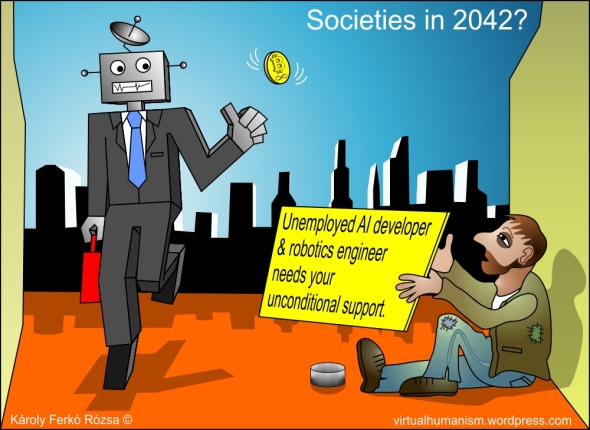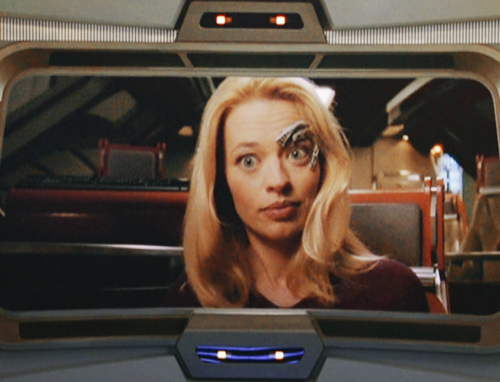Regina Saphier: Writing, Inner Speech & The Borg
Posted: November 28, 2014 Filed under: English Text, English Video | Tags: AI, Artificial Intelligence, Direct Brain Communication, inner monologue, inner speech, inner voice, Seven of Nine, Star Trek, The Borg, writing Leave a commentRegina Saphier: Writing, Inner Speech & The Borg
The adventures of our inner voices… in the age of artificial intelligence, direct brain communications and global online networks…
I swear I thought I am going to write about writing as a manifestation of my inner voice (silent thought processes that only you are aware of and only you can work with… until you write things down, speak them out loud or get them out of your mind in some other way with technology… no I am not joking), but I ended up in a completely different direction… this is why I write, to explore what is in there and what is out there and what is in between…
Writing is listening to my inner voice/speech (in a healthy way)… to my own thinking… It is a manifestation of my reflective capacity, my consciousness… and reading is listening to someone else’s inner stream of ideas (alongside your’s)… If you don’t realize that you do this, pay attention to yourself more. Just as many people are not aware of their inner imagery when reading a novel for example, the same way many people don’t know that they are running a narrative of their own reality in their heads… It is “on” so much so that only people well trained in meditation are able to turn off the inner voice, the inner speech, the random ideas, feelings and reactions… and there are mindful people attempting to guide and manage the inner speech and voice… to use it efficiently, even creatively (like me) and not let their inner processes ruin their experiences. Introverts are more in tune with this inner world.
Radio, Skype, Intimacy
I love the radio show: This American Life. I love many of the stories people tell or read on that show. Some are fiction, some are nonfiction. I think it is one of the best radio shows in the world. I always loved radio done by people who truly love to listen and tell stories.
I just noticed that a “voice only” skype chat with a friend and listening to “This American Life” stories on my computer or smartphone… these experiences have something in common. Perhaps it is intimacy. Films and video chats on skype never have this depth. When you see people, when you see yourself talking to someone, when you know you are being watched, when your conversation partner knows of being watched, you both remain highly self conscious (different people on a different level), even if you are old friends. When you listen to radio or to someone’s voice via skype (or via phone, if you do not have to hold onto the phone physically… remember how your hands could get tired of holding that thing… or your ears could hurt… these physical reactions keep you self aware), there is a depth of intimacy that you can never reach with the moving image and with a phone in your hand. The moving image is wonderful, but even if you put the camera right into someone’s bedroom and into their faces, the moving image can never be as intimate as hearing a person talk “only”. I am sure you can feel how overwhelming it is when some people film and photograph everything… and how calming it can be when you can just listen (listen to the other and to yourself) and relax. Of course photography is a brilliantly expressive art, and yes some images are worth a million words, but most images can never outperform a good voice chat online… and yes, I also love in person chats, of course, but those are different (due to the physical and the visual elements, it is simply harder to allocate all of your energy to the spoken layer). I love films, but I might opt for a good radio program instead.
Relying on Your Hearing Only
It is similar to blind people having unbelievable hearing, to the level of bats. When you “only” listen to someone, you become an emotional bat, navigating blindly in an emotional cave and relying on your listening skills and instincts. I believe this is a good way to improve your intuitive capacity. You don’t see with your eyes, you see with your mind’s other “eyes” and you go very deep, really fast, if you like. Your brain suddenly reaches a deeper level of listening and closeness.
This is similar to people sitting in completely dark rooms… they become highly intimate even with strangers (there is also less material for judgement… you are more able to feel close to another human being…). It is almost meditative when you listen deeply. Effectively, you can become a better listener if you only listen to people via skype and via radio. It is interesting to experience different modalities.
Inner Radio
I just realized, when I am writing, I am turning my inner radio on… I start listening to what I am thinking closely and I make it visible on my computer screen (would be nice to skip this part, the typing and the reading by making the process more direct). I ask myself questions without asking… the questioning of the self and the excavation of thinking processes and opinions are embedded in the process of writing. Writing is not typing. Writing is listening to myself and mapping how I am relating to the world. During writing your limited consciousness stops being a small mental container and turns into a portal for your deep mind… and the deep mind of sophisticated internet users is different from the mind of unconnected individuals who are not mindful. In the distant past when people were listening to their own inner narratives they had no real time options to see how that inner narrative related to other people’s deep mind and to facts.
Reading as Listening
Reading is listening too. Because after I posted this blog note, you started to read it (most likely) silently. I effectively speak to you silently… it is like asynchronous telepathy… you are listening to my inner voice in your head with some delay. When you start thinking about my ideas in your head, you virtually engage in a silent conversation with me. I only know it when you write back, or speak to me, but even if you do not, the conversation happens, even if “only” in your head (you will respond and resonate even if you do not write to me). Every person reading this blog conducts a secret parallel conversation with me in a hidden dimension of our universe. I believe that writers are essentially and primarily skilled inner conversationalist, explorers and listeners. Writers are even able to converse with people in the distant future (and with people in the past, when reading). I am writing for my own pleasure, to see what I think, but still, thank you for the conversation, now that you let me enter your mind with my inner voice and speech. It is my inner narrative that will survive as long as my writing is being read (or absorbed in some other way in the future).
The Future of Inner Speech and Mental Transfer
Perhaps one day people will no longer speak nor write to one another but simply use “technological telepathy” (just made this terminology up, because I know that the basic technology is already a reality in this area) to transfer this inner voice directly from mind to mind or from mind to computer (just like mental images are now recognized and reproduced by dedicated technology). It will be just as simple as leaving a message on an answering machine, or even easier. However, when I look at the difference in precision, I am thinking: how are we going to be able to be as precise and as nuanced as in writing? Are we going to think our ideas into a file and edit them by thinking about our thoughts? Isn’t it interesting to think about this? And when uploading our entire mind on a computer, are we going to edit out the personally embarrassing bits? And what are we to do with criminal minds?
Are we going to get help from AI to take our inner narrative to the next level? Will an AI companion read our minds to help us know what we think? Will an AI help us learn the things we need to know about the world and ourselves silently? Is it possible that we are becoming The Borg… a community of minds directly connected? Everyone hearing everyone else… Are we to become one mind? How are we to remain individuals in such a network? How are we to protect our minds from other people’s evil thoughts and destructive inner speech? Who is going to be in control of our minds?
Video: The AI based holographic Doctor teaching a former Borg, called Seven of Nine (a human being rediscovering her humanity lost during her childhood) on the show Star Trek: Voyager
Futurist Zoltan Istvan‘s transhumanist dream (and he is not alone with this dream) to upload his mind might just be the only reality for people in a machine age of constant learning, collective knowledge, the internet, robotics, space exploration and AI. But that won’t solve his fear of death, because he will still be gone one day… His knowledge, personality, and inner speech will melt into the collective. Humanity as The Borg…? “Seven of Nine”… “One of Seven Billion” today… But just how valuable will our minds be when AI systems will become more knowledgeable and more creative than people? Only we care about our ephemeral minds… Would you like your brain to be placed in an individual robot? Perhaps many people would be ok with that… Is your identity related to your body or your mind or both? Are YOU a mental process? Will our fear of death be replaced by the feeling of being intellectually and creatively obsolete when AI technologies become smarter and unfollowable for a human individual and even for humanity as a whole?
See? This is what I end up with today when I am thinking about writing as inner speech, a special way of self expression and listening. Our inner monologues will be highly and directly interconnected dialogues or group conversations in the future and that is probably an understatement of how our communications will be unrecognizable… and yet it will be natural even with technology, because our brains have the capacity to adapt. Writing and the spoken word might become obsolete sooner than we think. This will be the age of really big and fast understanding of unimaginably big “data”.
Articles I read mostly while I wrote the above post:
Telepathy is now a thing thanks to technology
http://www.seriouswonder.com/telepathy-now-thing-thanks-technology
Brain decoder can eavesdrop on your inner voice
http://www.newscientist.com/article/mg22429934.000-brain-decoder-can-eavesdrop-on-your-inner-voice.html
Artificial Intelligence Outperforms Average High School Senior
http://blogs.wsj.com/japanrealtime/2014/11/04/artificial-intelligence-outperforms-average-japanese-high-school-senior
Direct Brain Communication Between Humans Study Replicated
Controlling Genes with Your Thoughts: New System Regulates Gene Expression
http://www.scienceworldreport.com/articles/18813/20141112/controlling-genes-thoughts-new-system-regulates-gene-expression.htm
These People Want To Use The Internet To Live Forever
http://www.businessinsider.com/jamie-bartlett-on-transhumanism-2014-11
Regina Saphier: Experts don’t make the future. Dreamers do!
Posted: August 26, 2014 Filed under: English Text | Tags: dreamer, expert, eyewire, foldit, idealist, serious games, Star Trek, Unconditional Basic Income, Vivek Wadhwa Leave a commentThis is a cross posting of my article “Regina Saphier: Experts don’t make the future. Dreamers do!” published via LinkedIn on August 7, 2014.

Societies in 2042?
Unemployed AI developer & robotics engineer needs your unconditional support. (virtualhumanism.wordpress.com written by Regina Saphier)
Regina Saphier: Experts don’t make the future. Dreamers do!
I am writing this post in response to these LinkedIn influencer posts:
Vivek Wadhwa: We’re heading into a jobless future, no matter what the government does
Vivek Wadhwa: Why We Should Believe the Dreamers — And Not the Experts
Dear Vivek!
When I challenged you a few weeks ago to think about Unconditional Basic Income (as discussed in one of my blog notes), you responded that UBI equals unemployment in your opinion and that you are not sure the world is ready for that (note: I respectfully disagree, UBI would not cause unemployment and the world is just about to be ready for UBI). It is clear based on your blog on a jobless future that in addition you believe that new technologies also lead to unemployment. So, no matter what we do, the result is more unemployment in your opinion and there is no turning back. I agree. When you now write that people should opt for 20 or 10 hour work weeks you are not far away from the 5 or the zero hour work week (that comes next). In your other blog post you say people should know that experts are getting more and more puzzled by the future and are less and less able to predict what’s coming.
I agree: Dreamers Are The New Experts
There is one tiny problem: Mostly experts have the resources, dreamers usually don’t. Experts are usually part of the establishment and like to hold on to their power. Dreamers and idealist are usually outsiders and dislike institutions. Elon Musk is a rare kind of dreamer who is also an expert with self made resources. So, we have to find a way in the future to get more resources to the dreamers who possess or are ready to acquire and build expert level knowledge and find more experts with dreamer qualities.
To quote myself: “Many people sadly assume that if you work you earn an income and that this is the only way and that it is always true. Less people are able to imagine that if you have an income then you will work on things that matter based on your initiative and your diligence (based on inner motivation). We are up against the limitations of human imagination and experiences, NOT against economics. It is not economics that defines us. We are the ones creating and defining economics with our collective imagination.” This paragraph was taken from another relevant blog note written by me… basically Part 2 of my above mentioned UBI blog post.
All truth passes through three stages. First, it is ridiculed. Second, it is violently opposed. Third, it is accepted as being self-evident. (Arthur Schopenhauer)
Imagine
Isn’t it possible that sufficiently imaginative people are not very common in the field of economics? Isn’t it possible that when you suggest a shorter workweek you are stuck in an old paradigm that is completely outdated and not at all creative in terms of modern thinking? I think if we take David M. Kelley‘s principles of evoking creativity and combine his transformative methods with social issues and economics related innovation, we will be able to initiate a true paradigm shift.
For new kinds of ideas we need to discover new ways of thinking in a new era. To help you understand how silly it sounds to opt for 10 or 20 hour work weeks in the future: If Coursera or edX asked you to suggest a payment method three years ago during the planning phase (based on your latest article suggesting a drastically shorter workweek) you probably would have suggested that online students in India should pay “only” 25-50% of the tuition fee compared to American on campus students (at Stanford or at Harvard)… and so, would have completely rejected poorer talent in India based on simple personal lack of imagination, effort and courage. As we know that would ruin the entire massive model of these MOOCs, yet that would be the only thing you could come up with. I am sure in retrospect you would not want to take that kind of embarrassment upon yourself. People now have free choices for top level learning, and only exams come with a small fee (and even that can be waived). If this is possible, anything is possible. This is why either free utilities and/or (as I call it) “employment-independent optimal income” might and should be possible too (more and more of the technologies is there to make that possible) and instead of unemployment, it would mean massive open online entrepreneurship and human creativity with no existential pressure.
Serious Social Games
What we need is a new field of intuitive, compassionate and creative Social and Economic Engineering and Design or SEED, but ideally one that is not related to business, academia, party politics, nor government, rather one that is crowdsourced, that is based on big understanding of Big Data and Social Physics. Show me the numbers, the computer models, show me the online games that could test the hypothesis and trace the hidden, yet key mechanisms of positive social transformation. In EyeWire you can trace neurons, in FoldIt you can optimize proteins (these are serious online science games). I am positive there are serious game design opportunities to trace and optimally “fold” social structures, we just need to create those tools and mindsets on a global scale.
In the US the government was able to drive technological R&D. The same way, the task of the US government right now is to drive social and economic R&D. At the same time private foundations also must engage in financing social experiments that are based on careful, mindful and thoughtful research. The same is true for the EU that is now trying to shake up its economic situation, yet ignores the social elements and the ever present income inequality in eastern, southern, western and northern Europe. One day people are going to look back and think: How were people able to live during those dark ages?
What to Expect?
During my twenties I wanted the internet to provide me with information, let me exchange e-mails and chat lines and answer my questions. During my thirties I wanted the internet to connect me with the entire world, let me do research, let me express myself, let me build my online image and presence and provide me with top learning opportunities. During my forties I want the internet to find me the perfect jobs (as long as jobs are available), and provide me with an optimal income, as simple as that, independent of work in the traditional sense (in the future).
Just a Few Questions
Why do people take it for granted that facebook is perfectly welcome to earn money with our data, while we are not getting a penny? Why is it so natural that bloggers with excellent content get nothing while bad journalists earn money? Why can’t we track how our ideas pollinate the blogosphere and the mind of researchers and business people? Why is it that designers have to complain about their images being misused instead of having a solution that would make it possible for them to either receive automatic payments for every use or alternatively have their image posted with their work or website as an advertisement? How come the fitting jobs still can’t find you based on your extensive online content? How come society still thinks that creative human content writing (that can not yet be beaten by AI) should not be rewarded by the society that benefits from the producers’ inner motivation, diligence and hard work? We need more online activities that actually provide all sorts of income. We need to start squeezing more income out of the online sphere for everyone.
Social Scavenger Hunt
Here is an excellent example to tweak your attitudes and thinking regarding hidden value and access: The Bigger or Better Scavenger Hunt. This is a game college students and kids play in the US. The key idea is that you start with a small item, like a chewing gum and keep walking door to door asking for something bigger or better… like a book… or a pen drive… and in a few steps, after a few doors you might end up with a used smartphone. Imagine what you could end up with if you walked across the US… There are huge wasted assets and financial resources all over societies that need to be redistributed fairly in order to permit anyone to live an enlightened life on Earth. And developed societies must start to think about introducing Unconditional Basic Income, because when hundreds of millions of people start their grotesque jobs of 10 hours a week, what are we going to do to keep the middle class alive? And what about poor people who are without jobs already, some of them formerly known as lower or even upper middle class citizens? Everything happens so fast with technological development that we must speed up our social and financial adjustment and for that we need appropriate ideas for testing and we need to start the computer simulations yesterday to introduce the right policies tomorrow. After all, this is a social emergency!
Star Trek – Emergency Medical Hologram – “Please state the nature of the medical emergency!”
If you don’t know Star Trek Voyager: there is a brilliant holographic doctor with a slightly narcissistic personality… a gifted opera singer with the desire to be as human as possible. He is undoubtedly an important part of the starship crew and goes on all sorts of missions. Robert Picardo did an excellent job portraying a technology that appears to be human yet it isn’t. This EMH even has his own personality and his personality disorder to fit in perfectly with people. People in the story are never concerned with money, yet they aspire to do a good job, as does the Hologram. Members of the crew don’t get puzzled by the holographic team member, but they occasionally struggle with his personality traits. Very human indeed. I like this vision of a technology perfectly fitting in with humans, even having a sense of humor. And he (almost) never gets tired of asking what the emergency is…
The same way we should not get tired of asking: How are we going to sustain people in an era when human work no longer generates income? When income is a given and people still remain productive in so many ways… That should be a healthier avenue. Picture that! Please state the nature of the social emergency and use your imagination to solve it! Let us do this together.








